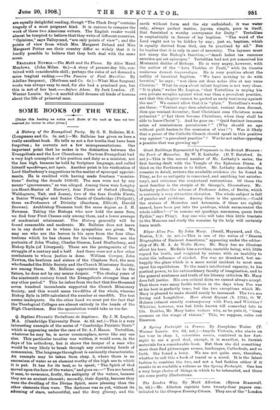Q. Septimi. Florentis Tertuiliani de Baptismo. By J. M. Lupton,
M.A. (Cambridge University Press. 4s. 6d. net.)—This is a very interesting example of the series of "Cambridge Patristic Texts" which is appearing under the care of Dr. A. J. Mason. Tertullian, whatever he may be, is never commonplace, never like any one else. This particular treatise was written, it would seem, in the days of his orthodoxy, but it shows the temper of a man who would be very likely to break through any restraining bonds of communion; The language throughout is eminently characteristic. An example may be taken from chap. 3, where there is an encomium of water as an element worthy of the high use to which it is put. It has for its text, so to speak, " The Spirit of God moved upon the face of the waters," and goes on :—" You are bound, O man, to reverence, firstly, the antiquity of the waters, because they are an ancient element; secondly, their dignity, because they were the dwelling of the Divine Spirit, more pleasing than the other elements then were. The darkness was as yet, without its adorning of stars, unbeautiftd, and the deep gloomy, and the earth without form and the sky unfinished; it was water only, always perfect matter, joyous, simple, pure in itself. that furnished a worthy conveyance for Deity." Tertullian is emphatically in favour of lay baptism. "The word of the Lord ought not to be hidden by any ; just so, baptism, which is equally derived from God, can be practised by all." But be implies that it is only in case of necessity. Th• layman must not usurp the Bishop's function,—" daudi habet ius summits sacerdos qui est episcopus." Tertullian had not yet conceived his Montanist dislike of Bishops. He is very angry, however, with the author of the " Acta Theklae et Pauli," with its licentia mulierum docendi tinguendique. Ho is very positive about the nullity of heretical baptism. " We have nothing to do with heretics," he says ; " non idem est dens nobis illis et nee unus Christus." What he sap. about infant baptism is not very clear. "It is plain," writes Mr. Lupton, "that Tertullian is urging his own private scruples against what was then a prevalent practice, and that this chapter cannot be quoted as early testimony against the use." We cannot allow that it is "plain." Tertullian'e words are these : " Veniant ergo dum adulescunt, veniant dum discnnt, dum quo veniaut docentur ; Sant Christiani cum Christum nesse potuerint" (" Let them become Christians, when they shall be able to know Christ "). And he goes on : "Quid festinat innocens aetas ad remissionem peccatorum ? " (Why should an age without guilt hasten to the remission of sins ?") Was it likely that a priest of the Catholic Church should speak in this positive way against " a prevalent practice " ? Was he not rather opposing a practice that was growing up ?










































 Previous page
Previous page